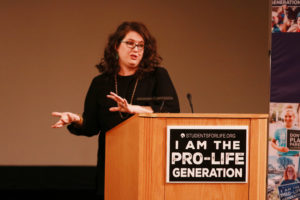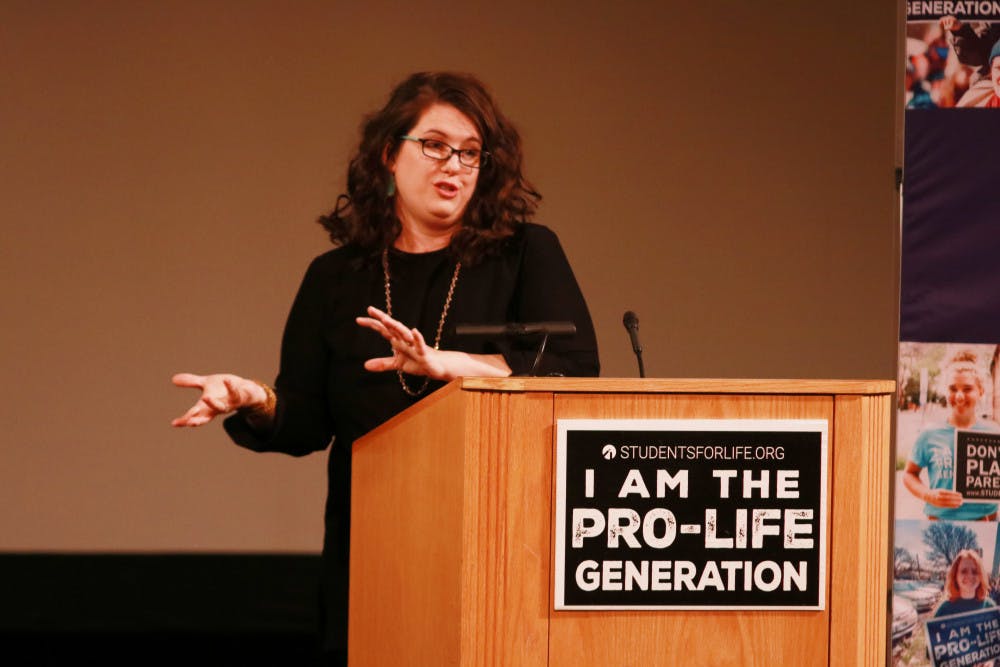By Miguel Gonzalez
News Editor
In the aftermath of this year’s contentious midterm election, TCNJ Students for Life held a presentation titled “Lies Pro-Choice Politicians Tell” on Nov. 7 at the Kendall Hall Main Stage Theater.
The student organization invited Kristan Hawkins, the president of Students for Life of America, to debunk five myths of the pro-choice movement and how abortion undermines the mental health, physical health and dignity of women, according to the speaker.
Growing up in Wellsburg, West Virginia, Hawkins did not know about abortion because the subject was not discussed in her house, school or local church. By the age of 15, she favored the pro-life movement after first volunteering in her town’s crisis pregnancy center, a non-profit organization established to counsel pregnant women against having abortions.
During her first day at the center, she vividly remembered how excited she was until she saw many clients around her age. At the time, the nearest abortion clinic to her hometown was 42 miles away in Pittsburgh. According to Hawkins, the majority of pregnant women were discouraged by the long trip.

Looking back on her time as a volunteer who helped persuade women to not seek abortions, Hawkins appreciated that the center provided a safe environment for grieving clients who recently found out that they were pregnant. With that experience in mind, she asserted that college students are too distant from the issue to understand the struggles pregnant women deal with.
“Those women who normally come to the center, their lives were so much different than yours,” Hawkins said. “Regardless of whether they chose the abortion in Pittsburgh, their lives were never the same. They weren’t looking forward to a future they envisioned themselves. They were surviving. Everyday — just existing was (their) victory.”
Hawkins further explained that many of the clients lived in poverty with barely a high school education. Moreover, she said women who have had abortions usually live in inescapable abusive relationships. After spending three months at the center, Hawkins realized that abortion does not necessarily erase women’s issues.
“Abortion doesn’t solve problems,” Hawkins said. “It creates new ones. It leaves behind pain.”
As an alternative to abortion, Hawkins wished to see social justice for women. In her view, social justice does not relate to progressive ideas lauded at campaign rallies, but as a means to repair broken, abusive relationships among couples and families. She said that crisis pregnancy centers are more than capable of providing counseling to women who feel isolated from financial and relationship issues.
After recalling her memories at the crisis pregnancy center, Hawkins rejected five claims made by pro-choice politicians in regards to abortion. She said the first claim was that abortion solves women’s problems. She then stated that the second claim was that abortion advances women’s rights. According to Hawkins, she never understood why pro-choice politicians believed abortion empowers the individuality of women.
“Our freedom and our dignity as women depends upon our right to kill someone weaker and smaller than ourselves that we help to create,” Hawkins said.
Hawkins demonstrated the second claim by referring to the 2016 Supreme Court case, Whole Woman’s Health v. Hellerstedt, where the Court struck down Texas’ state law that limited access to abortion clinics across the state, according to The New York Times.
Hawkins found a contradiction in the briefings of the 113 female attorneys involved in the case who stated in a brief that they had exercised their legal right to an abortion, according to The Atlantic.
She found it contradictory that women in the legal profession needed abortions in order to empower themselves and escape from problems like abusive relationships.
The third claim Hawkins outlined was that politicians falsely argue birth control methods do not cause a war against women’s bodies. She said that conflict against women’s bodies is the harmful effects of growth hormones from birth control pills. Along with abortion, Hawkins said that Planned Parenthood exacerbated the conflict by not educating women about the risks of birth control pills such as blood clots, infections and cardiac and respiratory arrests.
Coupled with the physical repercussions, Hawkins said that there are psychological consequences following abortion. She cited a study from The British Journal of Psychiatry in which out of 163,831 women who had an abortion, 81 percent of them had mental health issues.
The fourth claim that Hawkins argued was that legal abortion is necessary in order for women to not die from improvised abortions.
Hawkins later refuted the fifth claim that the majority of Americans currently favor access to abortion clinics. She rejected this notion because Americans are not specific in their responses in terms of which phase of pregnancy women should have abortions. She cited a Gallup poll which found that only 28 percent of Americans believe women should have an abortion in the second trimester. The rate falls to 13 percent in the third trimester.
Hawkins also said that abortion drives big business and significant political donations for the Democratic party. She cited an article from USA Today that explained how Planned Parenthood has donated approximately $50 million to Democratic candidates and lobbyists since 2012. She capped off her speech by reiterating why pregnant women should have the resources and counseling available in order to prevent abortions.
“My potential, your potential is not limited,” Hawkins said. “Our bodies are amazing. We can succeed as we are as women.”
Joseph Ballesteros, a senior nursing major and a pro-choice advocate, appreciated how TCNJ Students for Life invited someone with a different perspective to speak on campus. However, he saw more room left open for students to have a informative conversation about the abortion debate.
“We as students should be open for discussion with people such as like (Hawkins),” Ballesteros said. “I believe that students can benefit more if they openly discussed about abortion in safe spaces.”







